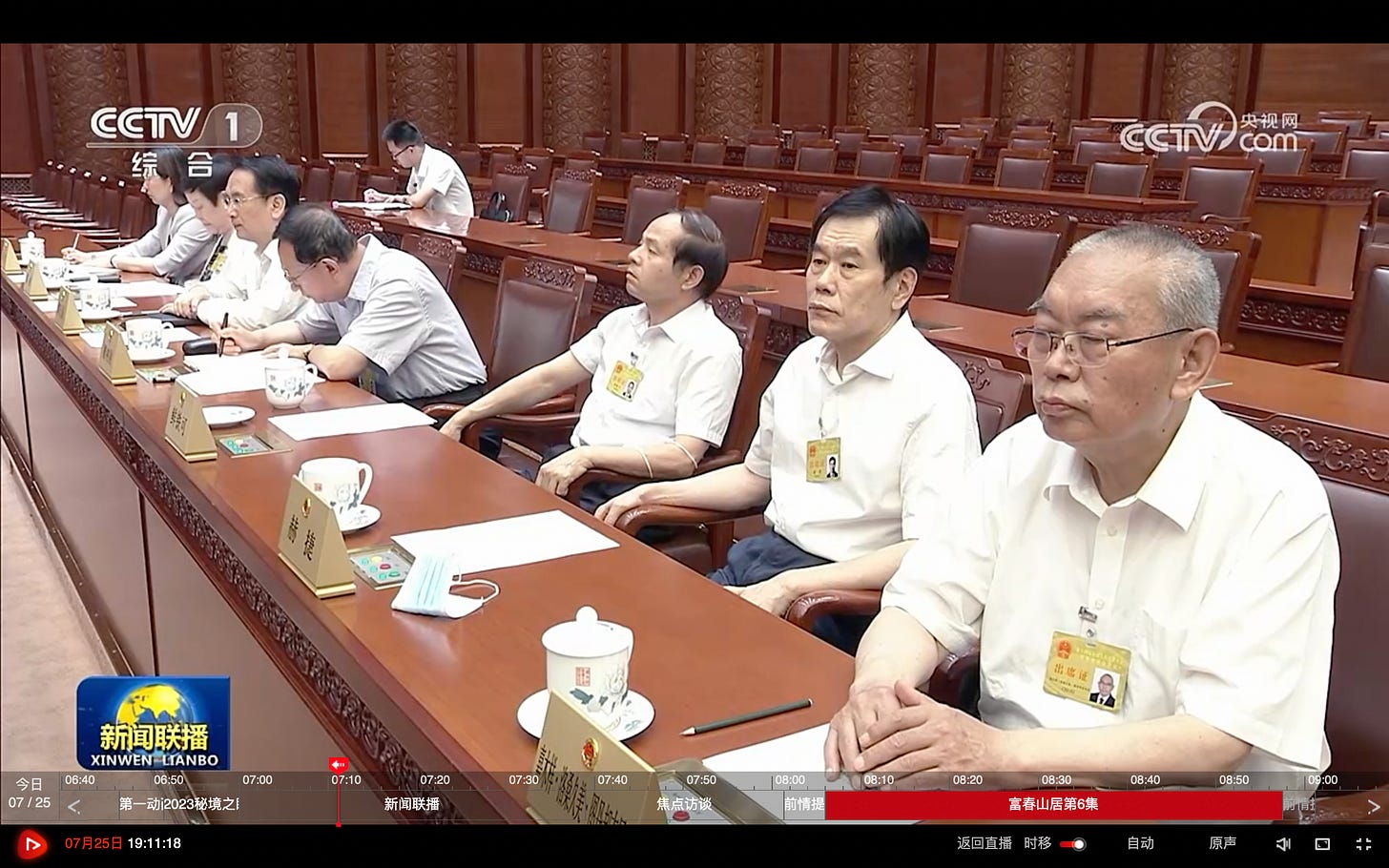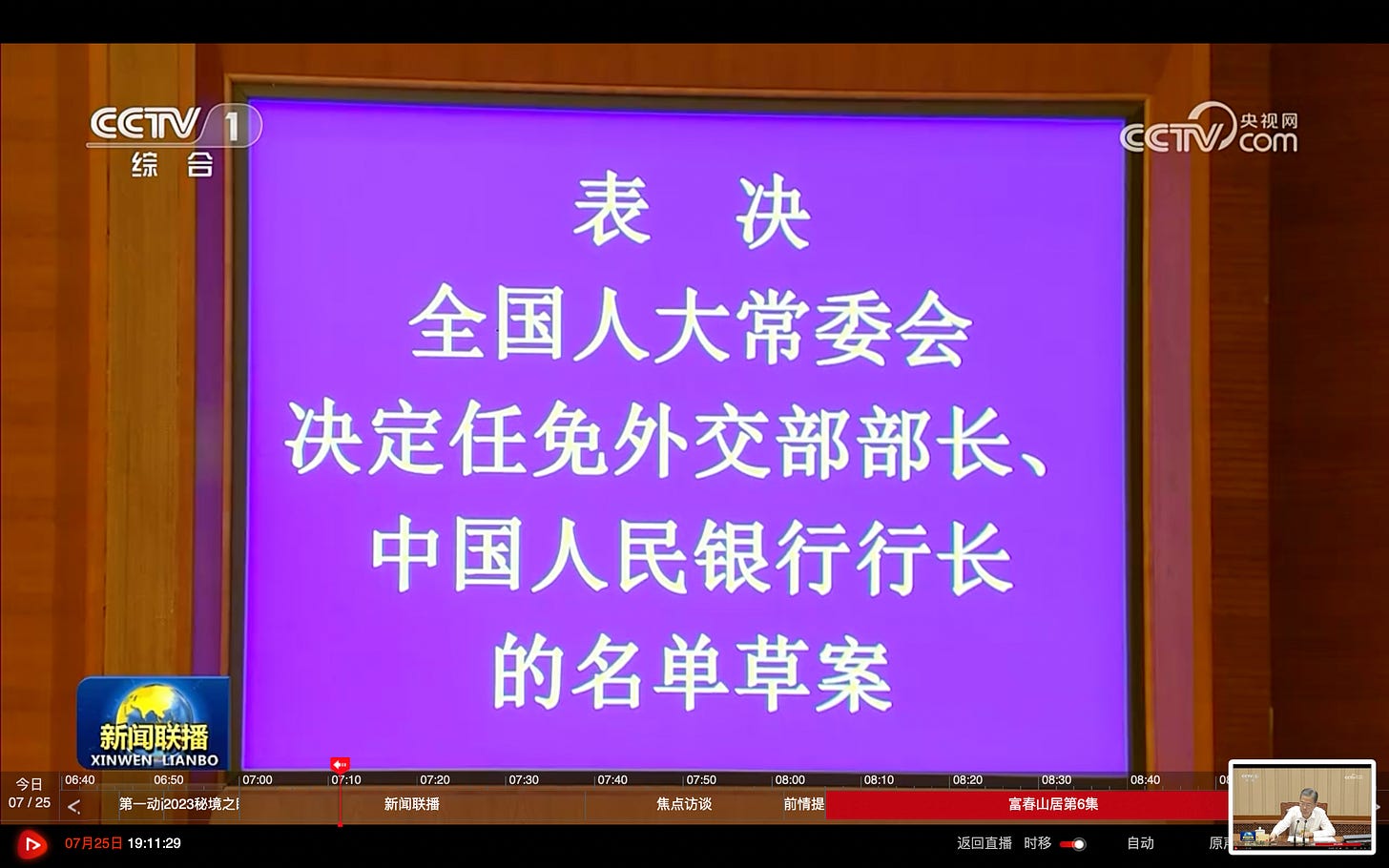“Qin Gang was removed from the post of foreign minister…according to a decision adopted at the fourth session of the Standing Committee of the 14th National People's Congress. President Xi Jinping signed a presidential order to effectuate the decision. Zhao Leji, chairman of the NPC Standing Committee, presided over the session, which opened on Tuesday morning.” (China Daily translation)
Zhao Leji presides over a tense meeting as CCTV’s cameraman pans the faces of the NPC members who assembled in the Great Hall for a “discussion” and vote on Qin Gang’s fate. Qin’s case was strategically played down, buried behind some insignificant news bits, but it still turned out to be one of the bigger stories of the day. The announcement about the decision on his fate was bundled with that of an unrelated case, the other being Yi Gang who was removed as Governor of the People’s Bank of China.
The hastily-convened meeting of the NPC represents, in official terminology, the fourth session of the Standing Committee of the 14th National People's Congress.
Qin Gang was missing for exactly one month before the party’s decision was made public, his fate entirely in limbo while the world watched in puzzlement, wondering what was going on in China.
During the month-long unexplained absence of China’s Foreign Minister, former foreign minister Wang Yi pitched in to fill the gaping hole in China’s diplomatic leadership on an ad hoc basis, which in itself was a vital clue as to which way the wind was blowing.
Wang Yi was Qin’s superior in the Foreign Ministry hierarchy when he was ambassador, but the two men had visibly clashing styles. In temperament and personality, they were as different as night and day, one reliably dour, the other quick to smile. It is rumored, but not known exactly, to what extent they differed on key policy questions, particularly on the question of leaning to Moscow or Washington.
Wang Yi is perceived as being more anti-Western than Qin Gang, and some of the decidedly undiplomatic comments he has made about the racial differences between Asians and the “sharp-nosed, yellow-haired” people of the West seem to confirm that.
Qin Gang’s actual whereabouts are still unknown, and only his political fate as Foreign Minister has been settled for the moment. Qin Gang was not expelled from the party and his position as state councilor does not seem to have been affected. He could be under liuzhi, an extralegal form of detention used to disappear, immobilize and interrogate officials. Given Qin’s purported links to Xi, he might also be at home under gentle “supervision” but with no freedom of movement or freedom to communicate.
The faces of the men and women in the NPC who convened to determine Qin Gang’s political fate show some ambivalence about the task at hand. The camera follows them, and shows them voting, so officially speaking, they went through the motions which is what the party required of them.
In personal terms, however, one suspects there was a wide range of opinion and some hesitation. It’s not for the faint of heart to castigate a popular foreign minister reputed to be a favored protege of Xi Jinping.
Reading tea leaves, the time-honored art of trying to figure out what is going on in a place where a concerted effort is made to make sure you don’t know what is going on, remains one way of putting together a narrative of what happened.
For those who follow the CCTV Follies or watch Xinwen Lianbo on a regular basis, I trust you will understand what I mean when I paraphrase Tolstoy and suggest that all happy meetings are basically alike. The scripted nature of most convos combined with the overbearing weight of protocol leaves little room for spontaneity or individual expression. Most meetings are a blur of talking heads, resounding applause and scribbling pens.
But people are people, and recognizing unhappy faces is a skill that transcends continents and cultures; even babies can do it. What’s harder to determine, of course, is precisely what the non-verbal behavior on display is intended to convey in political terms. There’s also the open question as to whether or not some of the pouting seen on camera is a kind of political hedge, in case Qin Gang isn’t done for for good. There’s almost a hostage video quality to the footage of the NPC meeting. As can be seen in the reaction shots below, everyone has their own unique ways to signal a lack of enthusiasm. For some, the controversial decision may have been made under duress.
Xi Jinping is known to watch CCTV’s Xinwen Lianbo and is bound to take note of who among his many political underlings sealed the fate of his protege. The camera points to about 20 of them, and it shows them in the very act of voting, so there isn’t much wiggle room except perhaps to pout.
These are just a few provisional observations based on my reading of today’s broadcast in the context of daily monitoring of CCTV News. Many unknowns remain, but safe to say this is a strikingly unusual segment of state TV coverage.
Happy politicians tend to look alike, at least when CCTV is portraying things like the imminent victory of the 20th party congress, though there too, a rare outbreak of emotion was visible in the forced removal of former leader Hu Jintao from Xi Jinping’s stage-managed coronation (the photo was caught on camera but excised for broadcast. Still, glum expressions and an unexplained empty chair remained.
Part of the fun and purpose of doing the CCTV Follies is that Chinese state TV reveals even as it tries to conceal, often telling us something it isn’t self-aware of.
CCTV gives us a close-up portrait of each of the 20 individuals on stage below.


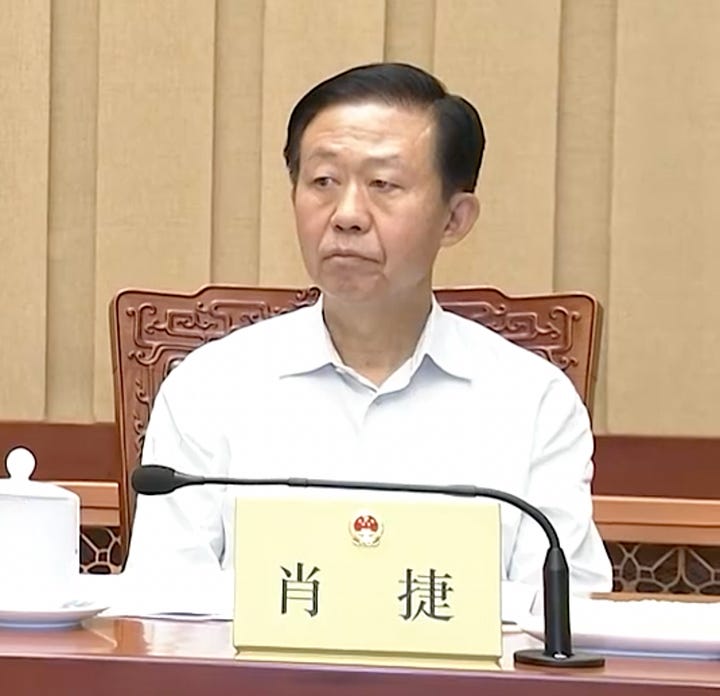
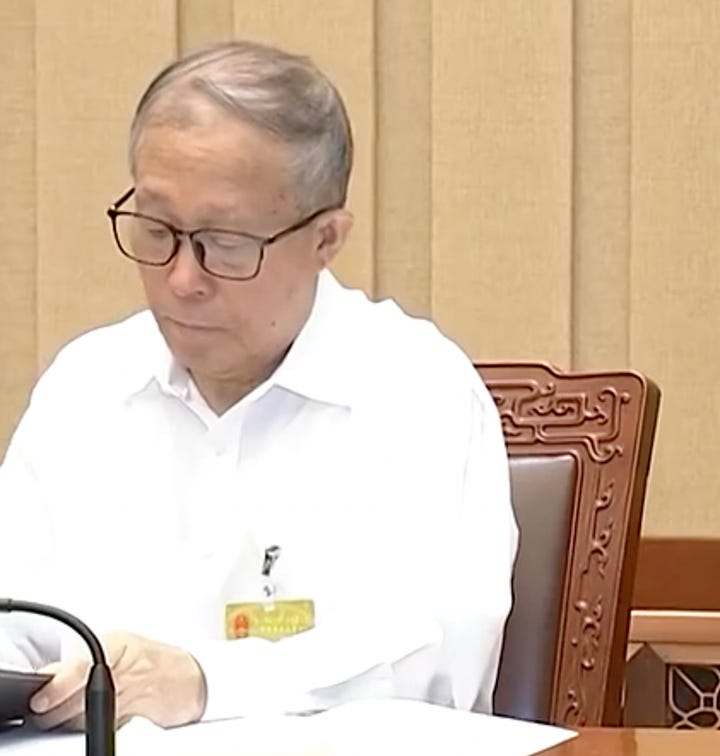
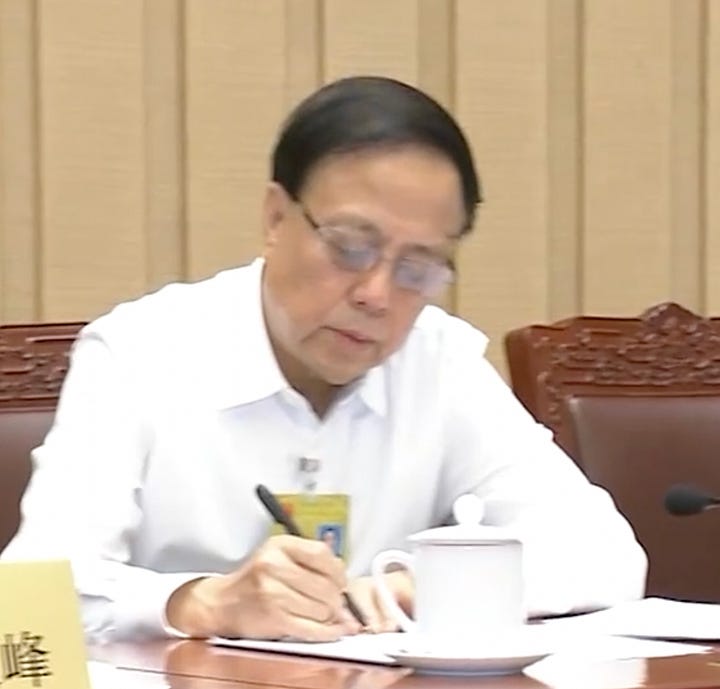




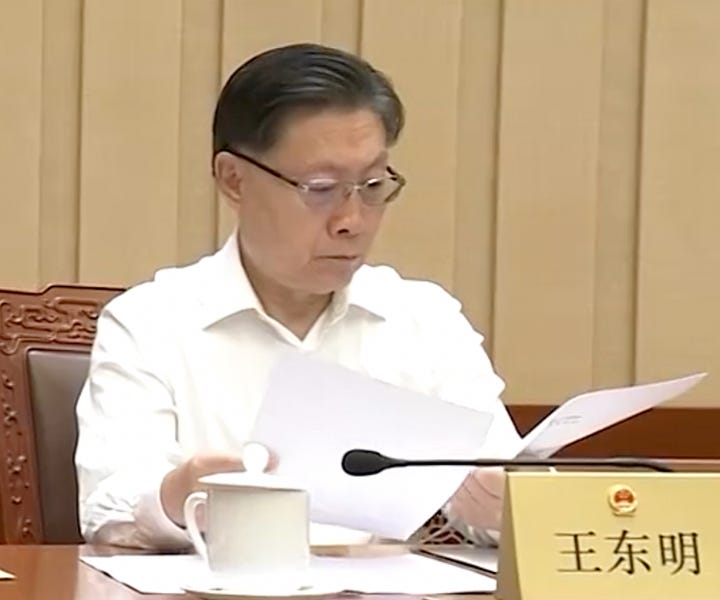


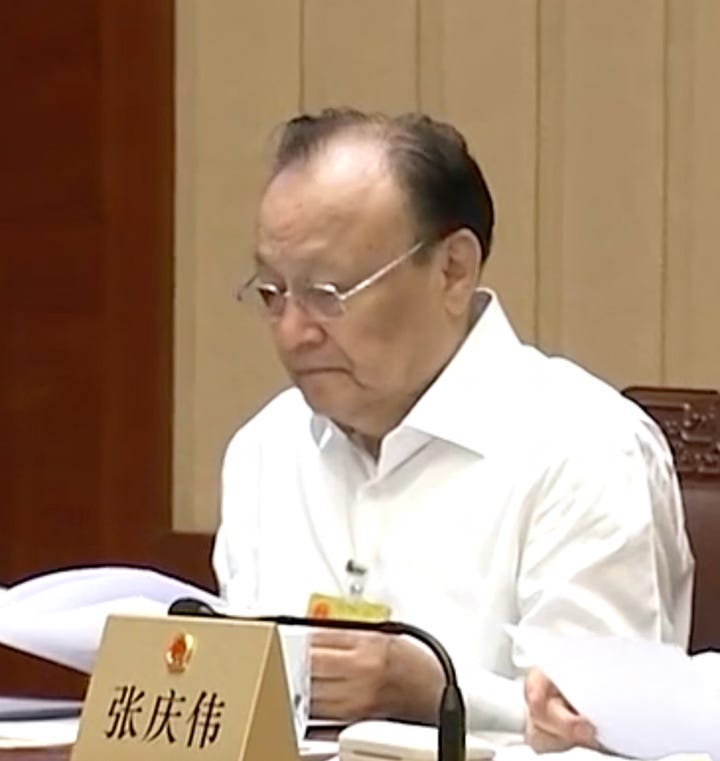


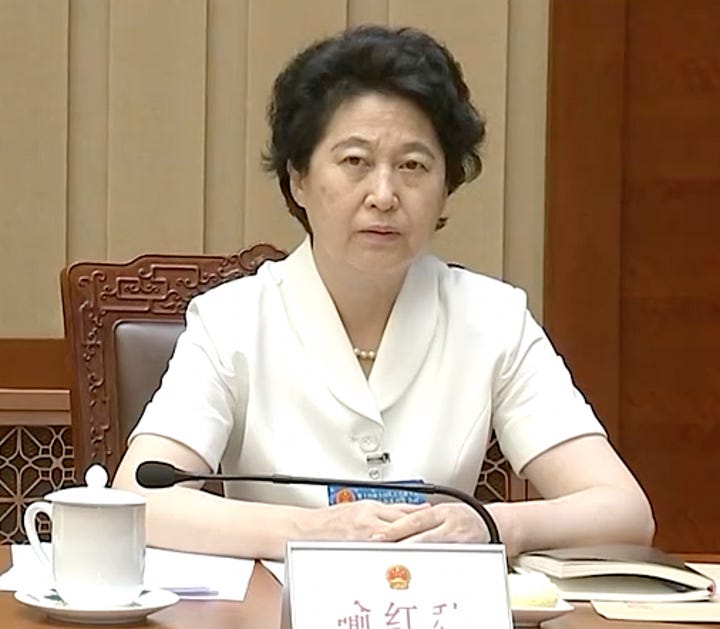


The July 25 broadcast opens with a picture of Xi Jinping meeting with the politburo in Zhongnanhai party headquarters. The narrator quotes Xi talking about the importance of high quality development of the armed forces.
Whatever he said or didn’t say, Xi looks fatigued and not in top form.


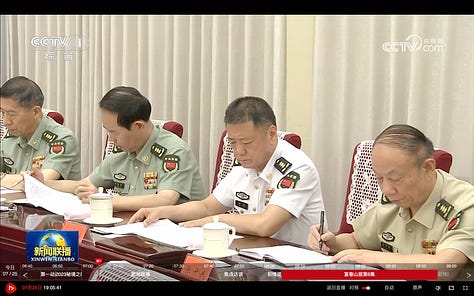
The news then segues into a nothingburger story about Xi’s correspondence with high schoolers in Hong Kong in which made the usual banal but pithy comments, such as “Patriotism lies at the heart of Chinese national spirit.”
This rather lengthy bromide was followed by the highly formulaic meme of Xi conveying congratulations to a freshly re-installed foreign leader, in this case the electoral “victory” of Hun Sen’s ruling party in Cambodia.
As for the big story that was threatening to paralyze China’s political establishment and had diplomats in China and around the world holding their breath for a month is buried deep in a blur of trivial news, and when it is announced, it is done in a rather dry, matter-of-fact way.
“Xi Jinping has signed a presidential decree.”
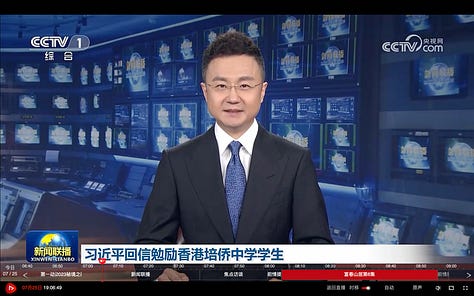
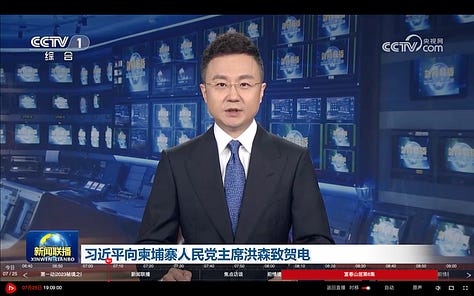

The usual pictures of Xi Jinping in action, mixing with the masses and pointing at things were entirely absent from the day’s news which was mostly delivered by the studio anchors as seen above. It was a slow news day because the news they were so busy trying to bury took a lot of space and time.
Finally a majesterial establishing shot of the entrance of the Great Hall of the People appears on screen. It’s a powerful national symbol used to reify the mandate of the party and in this case to accentuate the “electoral” authority of the special National People's Congress meeting that comes next.
The Standing Committee of the National People’s Congress of the People’s Republic of China
The full NPC only convenes a few times a year, but the Standing Committee can be convened on short notice, which is what happened in this case with the announcement having been made just one day in advance. Qin’s removal from office was bundled with an unrelated case to make the meeting seem merely routine and not an urgent piece of action just focused on him, but no one’s wondering much about the newly-appointed Governor of the People’s Bank of China, or the man he replaced for that matter.
CCTV’s “news” broadcast betrays no surprise nor does it offer muchattempt to explain why the Foreign Minister, missing for a month under murky circumstances, has been dismissed. Nor does it address the oddity of former Foreign Minister Wang Yi replacing the man who just replaced him. It evades the open question as to whether Qin Gang will retain his status as a state councilor, although it is noted that his position as Foreign Minister was concurrently held with another post
Think back to Xi's mentor Mao. What did he do with Deng Xiaoping? The way he sent him down twice, and brought him back again when the time was right is a well-known object lesson in China, though it also speaks to capricious leadership.
If someone's been useful, they might prove useful again in the future. Qin could be Xi's ace-in-hole, almost literally, since he's inside an information hole right now.
Back to CCTV. An adept camera crew shows the voting process in shocking detail, right down to the very instant that Qin Gang was terminated.
Chairman of the NPC and third-ranking member of the party’s politburo, Zhao Leji reaches forward to press the vote button confirming the removal of Qin Gang. His subordinates, despite a wide array of facial expressions and erratic posture, follow suit.
Ding! It’s done.
Qin Gang is gone.
For a review on Qin’s month missing in action and photographs of him doing diplomacy (already his presence is being scrubbed from Ministry of Foreign Affairs websites and his image hasn’t been seen on CCTV in a month) take a look at this earlier compilation of stories, speculation and highlights as ambassador.
PHOENIX FOLLIES: Where is Qin Gang?
July 24 update: An emergency NPC meeting about appointments and dismissals will be held on July 25. Xi Jinping has plans to leave Beijing for Chengdu to attend the university games. Gloomy faces all around as Zhao Leji presides















